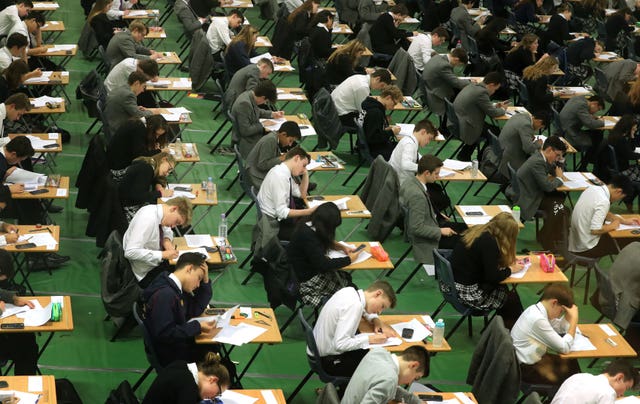One in five students unsure about starting university this year – survey
Most applicants think the new A-level grading system is less fair than in previous years.

Nearly one in five prospective students have changed their mind about going to university this autumn, or they are now uncertain, in light of the Covid-19 pandemic, a survey suggests.
Almost half (48%) of university applicants think that the coronavirus crisis will damage their chances of getting into their first-choice institution, according to a poll from the Sutton Trust.
Students from working-class backgrounds (51%) are more likely to think it will have a negative impact on them than their peers from middle-class backgrounds (43%).
The majority of would-be students (72%) think the new “calculated grade” system is less fair than in previous years – and more than two in five (43%) think their A-level grades will be worse as a result of the plans.
The poll, of 511 university applicants aged 17 to 19, shows that 19% have changed their mind about their university attendance this autumn, or they have yet to decide whether to go.
Some students are planning to take gap years while others have changed their preferred university amid the Covid-19 outbreak, according to the report.
It comes after vice-chancellors warned that universities may face “financial failure” amid the Covid-19 crisis due to a predicted sharp fall in international students this year.
The survey suggests that UK would-be students are also concerned about the university admissions process after this summer’s A-level exams were cancelled.
School and college teachers have been told to provide calculated grades for students which reflect the results they would have been most likely to achieve if the exams had gone ahead.
They will also rank pupils within each grade for each subject for their A-levels, but they are not allowed to share these with families until final results are issued in August.
Students who are unhappy with grades will have the opportunity to sit exams in the autumn.

Sir Peter Lampl, founder and chairman of the Sutton Trust, said: “There is a huge degree of worry and uncertainty amongst university applicants and current students about how the current crisis will affect them.
“There are no easy solutions to this unprecedented situation. But what is of upmost importance is that the poorest students don’t lose out.”
The charity has called for any potential cap on student numbers to be carefully implemented so that it does not disadvantage poorer students.
It has also called on exams regulator Ofqual to monitor any attainment gaps and consider adjustments under the new grading system.
A separate survey, of 895 home (UK) undergraduate students, found that more than a third (34%) have lost a job, had reduced hours, or not been paid for work since the crisis began.
And nearly one in three (30%) say that they are less able to afford study because of the crisis.
The report calls for further financial support from universities and the Government to ensure students can continue courses and access is not harmed for applicants from poorer homes.
Chris Millward, director for fair access and participation at the Office for Students (OfS), said: “This is clearly a very unsettling time for young people making decisions about their future, so they need good information and advice to make the right decisions for them about their futures.
“Universities and colleges have an important role to play here, by ensuring that their admissions processes take into account the context in which grades have been awarded and identify their potential to succeed.”
Geoff Barton, general secretary of the Association of School and College Leaders, said: “We understand the anxiety felt by some university applicants that A-levels will be graded this year in a way that none of us expected, but we would reassure them that everybody is committed to ensuring that results are fair and accurate for all students.
“Their schools and colleges know them well and will be able to provide centre-assessed grades to a high degree of accuracy.”
A Universities UK (UUK) spokesman said: “It’s important to remember that places will not be decided on predicted grades alone, with information in personal statements and references part of the decision-making process, along with any interview, portfolio, audition or other information relevant.
“We have also asked universities to be flexible this year and to recognise applicants’ contexts now more than ever, in recognition of the impact that a disrupted education may have on their applicants.”





